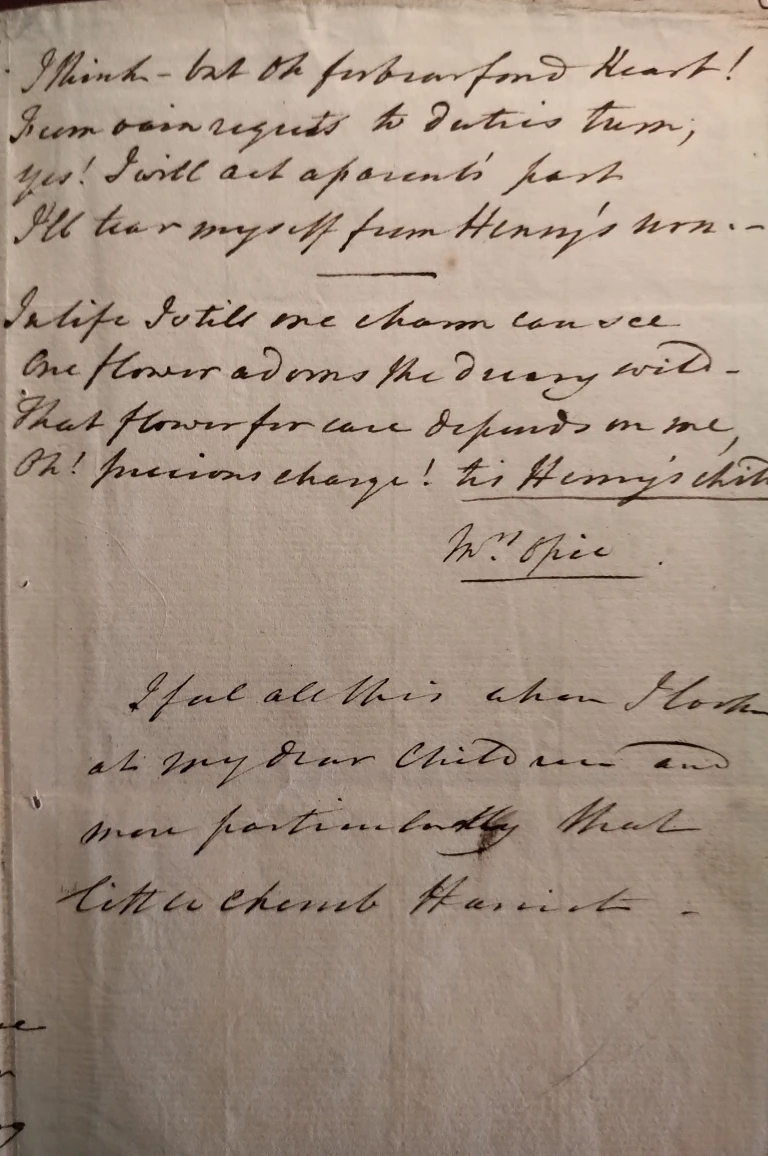This post is part of our Research in Reflection Spotlight Series, which will run through August 2025. After a decade of active and intense research and data creation, the WPHP is coming to a close this summer. To celebrate, this series shares reflections on the WPHP by our Research Assistants, Project Manager, past Project Manager turned Lead Editor, and Project Director, featuring memories, research, lessons learned, and ultimately the impact of the WPHP on the team who produced it.
Authored by: Salena Wiener
Edited by: Michelle Levy and Kate Moffatt
Submitted on: 08/19/2025
Citation: Wiener, Salena. "Reflections of a Research Assistant: Crumbs of Evidence to Research Rabbit Holes." The Women's Print History Project, 19 August 2025, https://womensprinthistoryproject.com/blog/post/149.
 Figure 1. Page 3 of the fair copy manuscript for Amelia Opie's "The Mourner"
Figure 1. Page 3 of the fair copy manuscript for Amelia Opie's "The Mourner"
(Amelie Opie Archive, https://ameliaopiearchive.com/the-mourner/)
Two years ago, I began working on the WPHP. I was thrilled to join a team of women invested in 18th and 19th century women’s book history, and I have learned so much from them. Through my time on the project my research interests have developed from Romantic women’s writing and data feminism into women’s manuscript culture and women’s labour in producing fair copies in the Romantic period.
One entry that inspired my interest in women’s labour in the period was Antiochus the great: or, the fatal relapse, a tragedy. As it is now acted at the New-Theatre in Lincolns-Inn-Fields. By his majesty’s Servants. Written by Mrs. Jane Wiseman. I had never heard of Jane Wiseman before, but when doing some research to add her to our Person records, I learned that she was a self-educated labouring class woman, and that Antiochus was the first play to be professionally produced in London that was written by a woman of her rank.
I was also tasked with researching bibliographies for canonical women writers in the period, and through that search, as I was looking at the Amelia Opie Archive website, I was surprised to come across digitizations of fair copy manuscripts of Opie’s work. In my research so far I’ve found that it is rare to have this kind of access to women’s fair copy manuscripts as they are often not digitized, so it was surprising and exciting to learn this existed.
Through this work I developed an interest in how the female body (or the female hand) is implicated in the production of manuscripts. I am particularly interested in, for example, Claire Clairmont’s fair copy work for Lord Byron, or Catherine Blake’s contributions to the production of William Blake’s plates. What traces remain of women’s labour in the production of manuscripts (and how can we expand our understanding of what constitutes a manuscript considering the different material practices of Romantic era authors)? What are the sexual and labour politics involved in women doing this work, given that they were often performing this labour as wives or lovers in the domestic space?
Working on the WPHP, with its broader aims of uncovering traces of women’s labour in the production of books in the 18th and 19th century, some of it left only in breadcrumbs, such as an initial on a title page, inspired my current dissertation research. I am grateful to be a part of a project doing this kind of feminist recovery work, and I hope to help carry this work forward with my dissertation.
WPHP Records Referenced
Amelia Opie (person)
Jane Wiseman (person)
